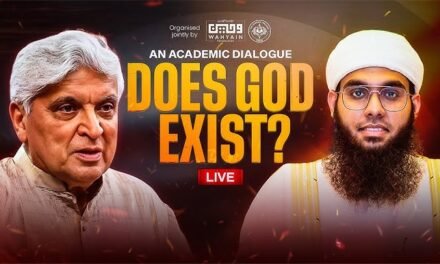~ Dr. Uzma Khatoon
In September 2025 during the Barawafat (Eid-e-Milad-un-Nabi), a simple four-word slogan, “I Love Muhammad ﷺ,” became the epicentre of a national controversy in India. What began as a local dispute over a banner during a religious procession in Kanpur, Uttar Pradesh, quickly spiralled into a series of protests, police actions, and heated debates across the country. This incident, seemingly minor at first, tore through the delicate fabric of India’s social harmony, raising critical questions about freedom of expression, religious sentiments, the role of the state, and most importantly, what it truly means to express love for a religious figure in a pluralistic and often sensitive society. This article explores the layers of this controversy, from the events on the ground to the deeper social, political, and spiritual discussions it has provoked.
The issue started during the preparations for Barawafat, a procession celebrating the birth of Prophet Muhammad ﷺ. On September 4, in Kanpur, a banner with the slogan “I Love Muhammad ﷺ” was put up along the procession route. This was seen as a new addition by local Hindu groups, who objected on the grounds that government rules and long-standing local agreements do not permit new traditions in established religious processions. The rationale behind such rules is to maintain communal harmony by preventing any group from using religious events to assert dominance or introduce changes that could be perceived as provocative by another community.
The police intervened, siding with the argument that to maintain peace, the status quo should be upheld. They removed the new banner and restored the previous setup. Initially, the police clarified that no First Information Report (FIR) was filed for the slogan itself, attempting to de-escalate the situation. However, the matter did not end there. On September 9, the situation escalated when an FIR was filed against 24 people. The police stated that the case was not about the religious slogan, but for allegedly introducing a new custom, changing the location of a traditional tent, and creating a situation that could potentially disturb the peace.
This news, amplified by a social media post from AIMIM chief Asaduddin Owaisi who stated that loving the Prophet is not a crime, spread like wildfire. Owaisi’s framing of the issue transformed it from a local administrative dispute into a nationwide cause for the defense of religious freedom. In response, Muslims in numerous cities across Uttar Pradesh, Telangana, Maharashtra, and Uttarakhand began holding protests. Many displayed ‘I Love Muhammad ﷺ’ banners as a sign of solidarity and to assert their religious freedom. While some demonstrations were peaceful and poignant, like a silent protest held by women in Lucknow, others turned violent, revealing the deep-seated tensions simmering beneath the surface. A significant clash occurred in Bareilly, where a protest called by local cleric Maulana Tauqeer Raza after Friday prayers drew a huge crowd. Tensions escalated when some protesters allegedly shouted inflammatory slogans and threw stones at the police, who responded with a lathicharge to disperse the gathering. The aftermath saw a chaotic scene, leading to the arrest of at least a dozen people and injuries to several policemen.
At its heart, the slogan “I Love Muhammad ﷺ” is a declaration of faith. In a country like India, with its rich tapestry of religions, such expressions are a daily reality. It is fundamentally no different from a Hindu devotee chanting praises for Lord Ram or a Christian expressing their love for Jesus Christ. The Indian Constitution, under Article 25, guarantees all citizens the freedom to profess, practice, and propagate their religion, subject to public order, morality, and health. From this legal and moral standpoint, expressing love for one’s Prophet should not be a cause for conflict or police action.
However, context is crucial. This sensitivity is heightened by India’s complex communal dynamics, where even symbolic acts during religious festivals can be perceived through a political lens, stirring anxieties. While the slogan is innocent in its essence, some have questioned the wisdom of its timing and public display, asking if it was intended to provoke a reaction in an already tense environment. This brings up a broader, more pressing issue: the need for moderation and regulation of all large religious gatherings on public roads. For the safety and convenience of all citizens, processions, whether for Ram Navami or Muharram, require clear guidelines to prevent public disruption and ensure they do not become displays of communal strength aimed at intimidating other communities.
A significant part of the debate has focused on the government’s response. The widespread filing of FIRs and the arrest of hundreds of people for peaceful protests are seen by many as a disproportionate and heavy-handed reaction. Critics argue that the authorities treated a simple expression of faith as a major law-and-order problem, thereby escalating a local issue into a national one. Such actions risk eroding public trust in democratic institutions and can make a minority community feel targeted and misunderstood. This is not about condoning violence, but about questioning whether the administrative response was balanced and just. A situation that could have been de-escalated through dialogue and community engagement was instead allowed to become a national issue, highlighting a potential failure in governance.
To understand the full picture, we must look at the internal dynamics of the Muslim community itself. It is an unfortunate reality that religious sentiments are often exploited for political gain. Within Indian Muslim society, there is a significant socio-political divide between the ‘Ashraf’ (those who claim foreign ancestry and are traditionally seen as the elite) and the ‘Pasmanda’ (indigenous converts, who form the vast majority and are often socially and economically marginalized). This division, extensively studied by social scientists, underscores the varied priorities and experiences within the wider Muslim community.
Historically, the Ashraf class has dominated the political and religious leadership. Critics from within the Pasmanda community argue that this leadership often uses emotional and religious issues to mobilize the Muslim masses. By focusing on identity-based agitations, they deflect attention from core issues like education, employment, social reform, and economic development that affect the Pasmanda community the most. In controversies like the “I Love Muhammad ﷺ” protests, it is often the Pasmanda youth who are on the front lines. They are driven by genuine religious passion and a desire to defend their faith, but they are also the ones who end up facing police batons, FIRs, and lengthy, expensive legal battles that can derail their lives. They become the foot soldiers in a larger political game played by leaders who gain visibility and power from such conflicts but are rarely seen on the ground when the consequences arrive. The real tragedy is that while the leaders issue statements from afar, it is the common, often poor, Muslim who pays the price for confrontation. This raises a crucial strategic question: is direct confrontation with the state on emotionally charged issues the wisest path, or does it ultimately harm the community it claims to represent?
This entire controversy forces a deeper, more introspective question: What does it truly mean to love Prophet Muhammad ﷺ? Does this love require validation through public slogans and banners, especially in a confrontational environment, or is it something more profound and personal?
True love, religious or otherwise, cannot exist without knowledge. It is impossible to genuinely love someone without understanding who they were, what they stood for, and the principles they lived by. Therefore, the first step in loving the Prophet is to learn about his life (Seerah). This love is meant to be a natural outcome of genuine admiration for his character. When we study his life, we find qualities that offer timeless lessons for all of humanity.
Long before his prophethood, in a society rife with tribal conflict, he was known by the title “Al-Amin” – The Trustworthy. His honesty was absolute. Even his most bitter enemies, who rejected his message and sought his life, entrusted their valuables with him for safekeeping. This teaches us that the foundation of a noble character is truthfulness. Despite being the messenger of God and the leader of a growing state, he lived a life of incredible humility. He mended his own clothes, milked his own goats, and sat with the poorest of people, sharing their meals. His life is a powerful reminder that true greatness lies not in power or possessions, but in service and humility.
Perhaps the most powerful lesson comes from his example of forgiveness. After years of brutal persecution, torture, and exile by the people of Mecca, he returned as a conqueror. The same people who had abused him, starved his family, and killed his followers stood before him, defeated. He had the power to exact any revenge he wished. Instead, he asked them, “What do you think I will do to you?” They replied, “You are a noble brother, the son of a noble brother.” He then declared, “Go, you are free.” This act of supreme mercy, at the moment of absolute victory, is the highest example of strength and compassion. The deepest reason for the love Muslims feel for him is his own profound love for them—his “Ummah.” It is narrated that he would weep in his prayers, begging God for the forgiveness of his followers, including generations he would never meet. In the final moments of his life, his last whispered words were not for himself, but for his people: “Ummati, ummati” (“My community, my community”).
Proving one’s love for Prophet Muhammad ﷺ is not achieved by raising banners in a charged atmosphere, especially when it can be manipulated by political interests and lead to self-harm. The true test of this love lies in our character. Do we embody his honesty in our business and personal lives? Do we practice his humility in our interactions with others? Can we show his compassion and forgiveness to those who have wronged us? Are we serving our communities and helping the poor and marginalized as he did? This is the real challenge. The goal must be to transform the slogan “I Love Muhammad ﷺ” from a banner on the street into a living reality in our hearts and actions. The best way to honour him is to become a reflection of his teachings—a source of peace, justice, and mercy in the world. In a diverse nation like India, this path of constructive character-building, rather than reactive protest, is what will truly serve the community and strengthen the entire nation.
Dr. Uzma Khatoon, former faculty at Aligarh Muslim University, is a writer, columnist, and social thinker.
Disclaimer: This article has been published in the ‘Greater Kashmir’ newspaper on 03/10/2025.





